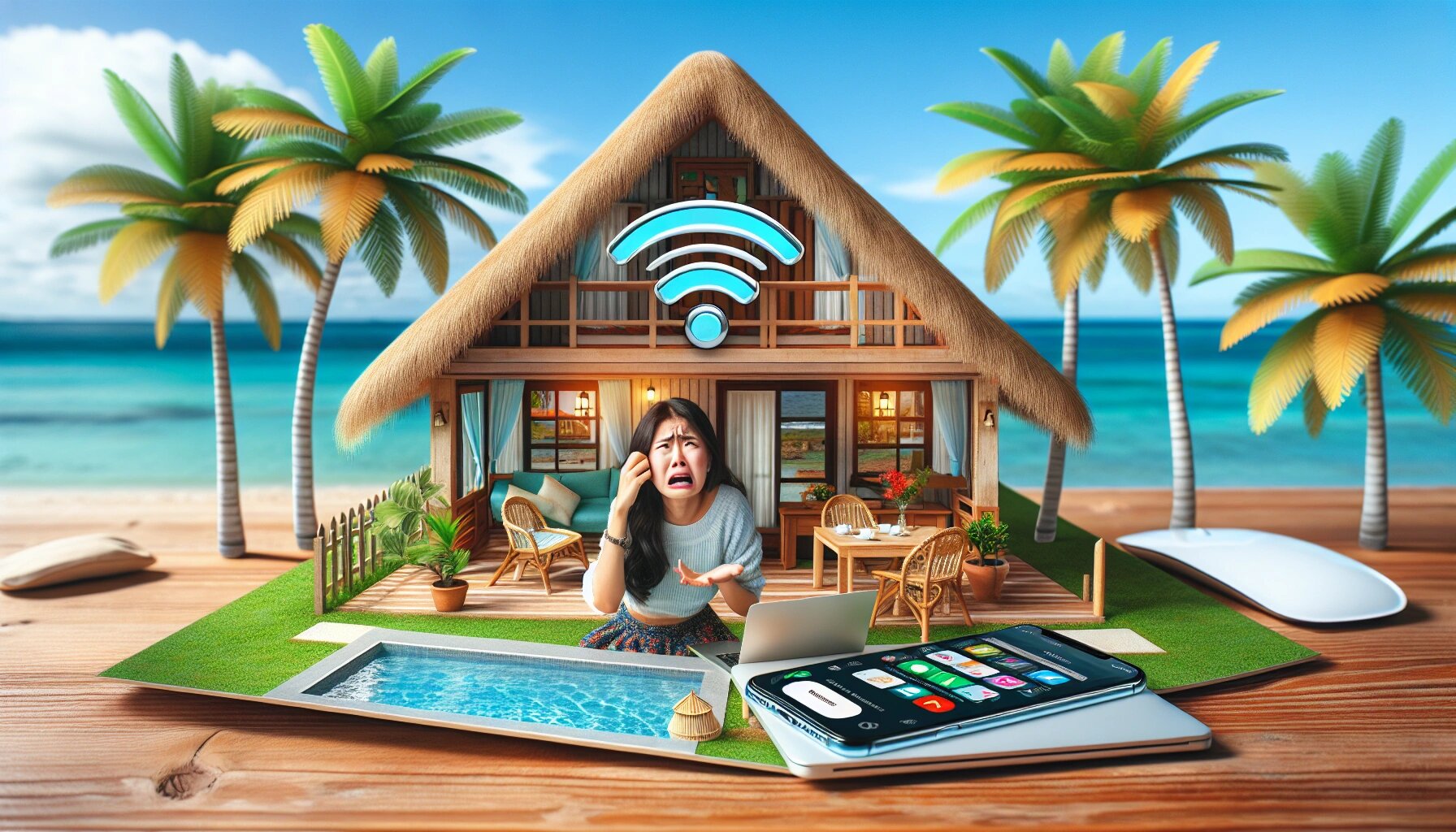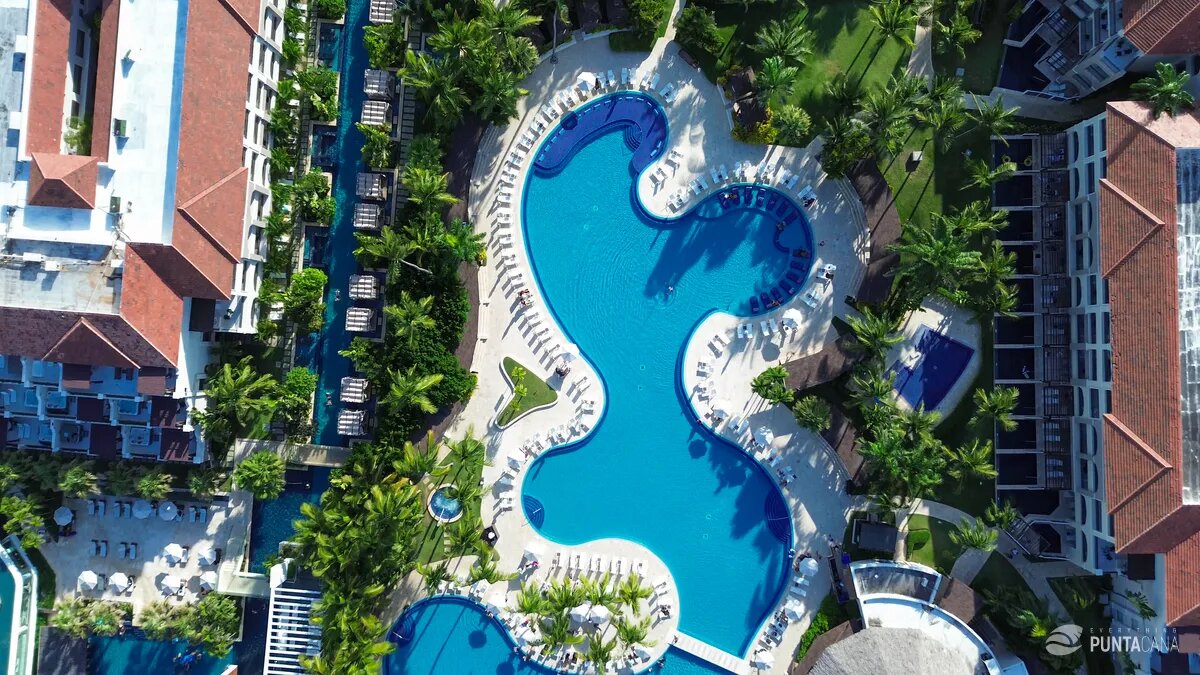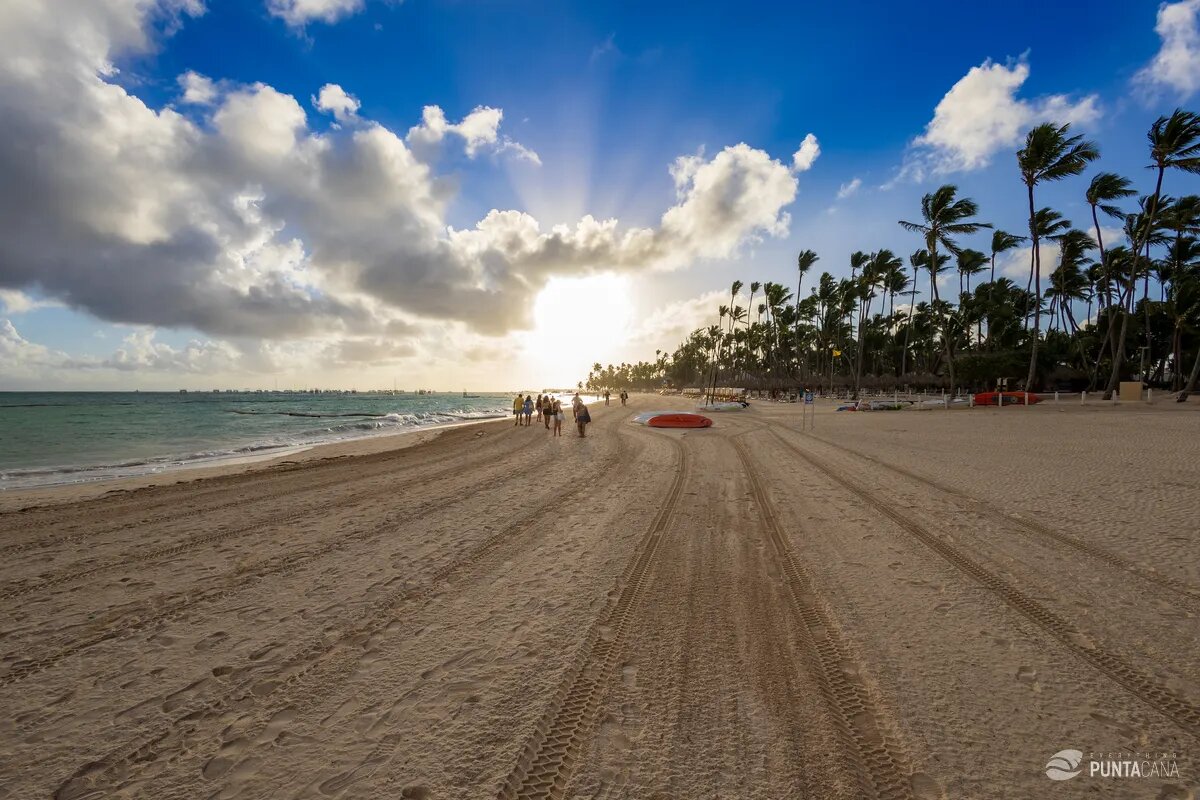What Happens If the Wi-Fi Doesn’t Work? Internet Realities in Punta Cana Rentals
Understanding the Importance of Wi-Fi in Punta Cana Rentals

What Happens If the Wi-Fi Doesn’t Work? Internet Realities in Punta Cana Rentals
In today’s digital age, having dependable Wi-Fi in vacation rentals is not just a perk—it’s an expectation. For travelers heading to Punta Cana, a destination renowned for its beautiful beaches and luxurious accommodations, reliable internet access is crucial for a seamless travel experience.
1. The Role of Wi-Fi in Modern Travel
Wi-Fi has revolutionized how we travel, offering a lifeline that keeps us connected to the world. For many visitors in Punta Cana, the presence of stable Wi-Fi can make or break their vacation experience. Internet connectivity plays a critical role in travel plans, from booking excursions online to accessing digital maps and guides, ensuring that travelers can explore with confidence and convenience.
Moreover, guest satisfaction is heavily influenced by the quality of Wi-Fi provided in rental properties. According to a survey conducted by TripAdvisor, over 80% of travelers consider Wi-Fi availability as a deciding factor when booking accommodations. This statistic underscores the importance of internet access in meeting guest expectations and enhancing their overall experience.
2. Remote Work and Digital Nomad Trends
With the rise of remote work and the digital nomad lifestyle, the demand for dependable Wi-Fi in vacation rentals has skyrocketed. Punta Cana, with its picturesque landscapes and vibrant culture, is becoming a popular destination for digital nomads seeking a balance between work and leisure.
Remote workers require robust internet connections to participate in video conferences, upload large files, and maintain productivity while traveling. This shift towards working remotely has led to an increased emphasis on Wi-Fi quality, as travelers seek destinations that can accommodate their professional needs without compromising on the experience.
3. Entertainment and Connectivity Needs
For many vacationers, staying connected with family and friends is as important as enjoying their travels. Wi-Fi provides the platform for sharing experiences through social media, streaming favorite shows or movies, and keeping in touch with loved ones back home. The ability to access entertainment and maintain personal connections has become a fundamental part of the travel experience.
In Punta Cana, where evenings can be spent lounging in luxurious rentals, having reliable Wi-Fi ensures that guests can relax and unwind with their preferred digital content. This connectivity also allows travelers to stay informed about local events and activities, enhancing their stay in this tropical paradise.
In conclusion, the importance of Wi-Fi in Punta Cana rentals cannot be overstated. It is a vital component that facilitates modern travel, supports the growing trend of remote work, and caters to the entertainment and connectivity needs of today’s travelers.
Common Wi-Fi Issues in Punta Cana Rentals

Punta Cana, drone view
Staying connected while on vacation is no longer just a luxury; it’s a necessity for many travelers. However, in Punta Cana rentals, Wi-Fi connectivity can sometimes be less than ideal, presenting a variety of challenges that guests may encounter during their stay.
1. Signal Strength and Coverage Problems
Signal strength and coverage are common issues faced by guests in Punta Cana rentals. Many properties may not have adequate Wi-Fi infrastructure to cover all areas, leading to frustrating dead zones where connectivity is poor or nonexistent. This can be particularly problematic in larger villas or properties with multiple floors.
To mitigate these issues, property owners are encouraged to invest in mesh networking systems or additional Wi-Fi extenders to enhance signal distribution throughout the property. Moreover, guests should be informed about the best areas for connectivity upon arrival.
2. Interference from Environmental Factors
Punta Cana’s beautiful natural surroundings, while a major attraction, can also contribute to Wi-Fi issues. Environmental factors such as thick vegetation, weather conditions, and even building materials can significantly interfere with Wi-Fi signals. Heavy rains, common in tropical regions, may cause temporary disruptions in connectivity.
In addition, properties constructed with dense materials like concrete or brick can impede signal transmission. As a solution, property owners might consider placing routers in central locations and ensuring that the hardware is suited to the environment, possibly opting for outdoor-rated equipment if necessary.
3. Network Congestion and Bandwidth Limitations
With the rise of digital nomadism and the general trend towards more online activities, network congestion is a growing issue in vacation rentals. When multiple guests or families are using the internet simultaneously, it can lead to slow speeds and interruptions. Streaming services, video calls, and online gaming are particularly bandwidth-intensive activities that can strain the network.
Impact of Network Congestion on Wi-Fi Performance
| Activity | Bandwidth Usage | Potential Impact |
|---|---|---|
| Streaming HD Video | 3-6 Mbps | May cause buffering if many users stream simultaneously |
| Video Conferencing | 1.5-3 Mbps | Risk of poor call quality with high network usage |
| Online Gaming | 3-25 Mbps | Possible lag and disconnections |
| General Browsing | 0.5-1 Mbps | Minimal impact unless network is heavily congested |
To address these issues, rental owners can consider upgrading their internet plans to higher bandwidth options and educating guests on the optimal usage of the network, possibly implementing usage guidelines to avoid peak-time congestion.
Immediate Steps to Take When Wi-Fi Fails
In the digital age, a stable internet connection is more than a convenience—it’s often a necessity. When Wi-Fi issues arise during a stay in Punta Cana rentals, it can disrupt everything from work to entertainment. Here’s how to tackle connectivity challenges efficiently.
1. Troubleshooting Basic Connectivity Issues
Before contacting your rental host, it’s wise to try some basic troubleshooting steps. Often, the solution to Wi-Fi issues can be straightforward and quick.
- Restart the Router: One of the simplest and most effective solutions is to reboot the router. Unplug it from the power source, wait for about 30 seconds, and then plug it back in. This can resolve many connectivity issues by refreshing the connection.
- Check Device Settings: Ensure that Wi-Fi is enabled on your device and that it is connected to the correct network. Sometimes, the problem might be as simple as an incorrect password or a device not being set to connect automatically.
- Proximity to the Router: If the signal is weak, try moving closer to the router. Obstacles and distances can significantly affect signal strength, especially in larger rental properties.
2. Contacting the Rental Host or Property Manager
When basic troubleshooting doesn’t work, it’s time to reach out to your rental host or property manager. Here’s how to ensure effective communication:
- Prepare Relevant Information: Before contacting your host, gather pertinent details such as the nature of the problem (e.g., no connection, slow speeds), any error messages you’ve encountered, and the troubleshooting steps you’ve already taken. This information can help the host or technician diagnose the issue more promptly.
- Use Clear Communication: Clearly explain the issue and the urgency of the situation. If you’re relying on the internet for work or critical communication, mention this to emphasize the need for a swift resolution.
- Follow Up: If a solution isn’t provided immediately, follow up regularly. Keep records of your communications, including times, dates, and the content of your conversations.
3. Using Mobile Data as a Temporary Solution
In cases where Wi-Fi issues are not resolved promptly, using mobile data can be a practical backup solution. Here’s how to make the best use of your mobile data:
- Check Your Data Plan: Before relying heavily on mobile data, review your data plan to understand any limitations or additional costs that might be incurred. Many plans offer affordable roaming packages that can be activated for short-term use.
- Enable Mobile Hotspot: Most smartphones allow you to share your mobile data connection through a hotspot. This can provide internet access for laptops and other devices that usually rely on Wi-Fi. Be sure to secure your hotspot with a strong password to prevent unauthorized access.
- Monitor Data Usage: Keep an eye on your data usage to avoid exceeding your plan’s limits. Most smartphones have settings to track usage and send alerts as you approach your limit.
With these proactive steps, you can mitigate the inconvenience caused by Wi-Fi disruptions, ensuring a more enjoyable and stress-free stay in Punta Cana. Remember, staying informed and prepared can make all the difference when technology falters.
Long-Term Solutions for Reliable Wi-Fi in Rentals
In today’s fast-paced digital world, providing reliable Wi-Fi in vacation rentals is not just a luxury—it’s a necessity. For property owners in Punta Cana, ensuring that guests have consistent and fast internet access is crucial for maintaining high satisfaction rates and garnering positive reviews. Here, we explore long-term strategies that can significantly enhance the Wi-Fi experience in rental properties.
1. Installing High-Quality Routers and Extenders
Investing in high-quality networking equipment is the cornerstone of reliable Wi-Fi service. Advanced routers and extenders can provide broader coverage and handle multiple devices simultaneously without significant speed loss. When selecting a router, consider models that offer dual-band or tri-band frequencies to minimize interference and optimize performance.
Comparison of Networking Equipment Features
| Feature | Basic Routers | Advanced Routers | Wi-Fi Extenders |
|---|---|---|---|
| Frequency Bands | Single Band | Dual/ Tri-Band | N/A |
| Coverage Area | Limited | Wide | Expands Existing |
| Device Capacity | Few Devices | Multiple Devices | Supports Existing |
| Cost | Low | Moderate to High | Low to Moderate |
To further enhance coverage, particularly in properties with multiple floors or thick walls, installing Wi-Fi extenders can be a game changer. These devices amplify the signal, ensuring that guests can enjoy uninterrupted connectivity in every corner of the property.
2. Regular Maintenance and Network Updates
Routine maintenance and updates are vital to keep the network running smoothly. Regularly updating the router’s firmware can improve security, fix bugs, and enhance performance. It’s also advisable to periodically check the network for unauthorized devices that may be consuming bandwidth.
Scheduling regular maintenance checks can prevent potential disruptions and identify issues before they impact guests. Property owners should establish a maintenance calendar to ensure that these checks are consistently performed, preferably during low-occupancy periods to minimize guest inconvenience.
3. Collaborating with Local Internet Service Providers
Forming partnerships with local internet service providers (ISPs) can be a strategic move towards ensuring stable and robust internet access. ISPs can offer insights into the latest technological advancements and provide customized packages tailored to the needs of vacation rentals.
Many ISPs offer service agreements that include regular maintenance, priority customer support, and guaranteed uptime percentages. By leveraging these partnerships, property owners can provide a more reliable internet experience and potentially negotiate better rates for bulk or long-term contracts.
Collaborating with ISPs can also open doors to implementing fiber-optic internet, which is renowned for its high speed and reliability. Although initially more expensive, the long-term benefits of fiber-optic connections, such as faster speeds and reduced latency, can significantly enhance guest satisfaction and set the property apart from competitors.
By adopting these long-term solutions, property owners in Punta Cana can transform their internet offerings from a potential source of guest dissatisfaction to a highlight of their rental experience. With the right investments and partnerships, reliable Wi-Fi can become a valuable asset that enhances the overall appeal of the property.
Alternatives to Wi-Fi for Staying Connected
When visiting Punta Cana, the allure of sandy beaches and vibrant nightlife might make a Wi-Fi disconnect seem trivial. However, for those needing to stay connected for work or personal reasons, having a backup plan is essential. Fortunately, there are several alternatives to traditional Wi-Fi that can keep you online and connected.
1. Local SIM Cards and Mobile Hotspots
One of the most convenient and often cost-effective methods of staying connected in Punta Cana is by utilizing local SIM cards or mobile hotspots. Many visitors choose this route for its flexibility and reliability, especially when traditional Wi-Fi falters.
Local telecom providers such as Claro and Altice offer prepaid SIM cards that provide ample data for browsing, streaming, and even video calls. These can be easily purchased at the airport or from retail outlets across the Dominican Republic. Once inserted into an unlocked smartphone, they offer a seamless connection to the local network.
Mobile hotspots, available for rent from various local vendors, provide another viable option. These pocket-sized devices can connect multiple devices to the internet, offering a portable solution that’s perfect for groups or families traveling together. Rates are generally affordable, and they can be a lifesaver in areas where Wi-Fi connectivity is unpredictable.
2. Internet Cafes and Co-Working Spaces

Punta Cana
For those who need a more structured environment for working or simply prefer a change of scenery, internet cafes and co-working spaces in Punta Cana offer an excellent alternative. These venues not only provide reliable internet access but also serve as hubs for digital nomads and remote workers.
Internet cafes are scattered throughout the city and are ideal for quick tasks like checking emails or making calls. They usually charge by the hour or offer day passes, making them a flexible choice for tourists.
Co-working spaces, such as Selina CoWork in Bavaro, offer a more comprehensive package for longer durations. Equipped with high-speed internet, comfortable workstations, and networking opportunities, these spaces are perfect for those looking to maintain productivity while enjoying their time in Punta Cana. Membership options vary from daily passes to monthly memberships, catering to different lengths of stay.
3. Satellite Internet as a Backup Option
For those venturing into the more remote areas of Punta Cana where traditional connectivity options are sparse, satellite internet can be a reliable fallback. While not as common as other methods, satellite internet provides a solution where terrestrial networks might fail.
Satellite internet leverages communication satellites to provide internet access, ensuring coverage even in the most secluded spots. Companies like HughesNet offer satellite services that can be tailored to the specific needs of travelers, ensuring a constant connection regardless of location.
While installation and setup might require initial coordination with service providers, the payoff is consistent internet access, which is crucial for those who cannot afford to be offline. This option is particularly beneficial for long-term stays or for those who frequently travel to remote areas.
In conclusion, while Wi-Fi connectivity in Punta Cana rentals might sometimes falter, a variety of alternatives exist to ensure you stay connected. Whether through local SIM cards, internet cafes, or satellite internet, travelers can enjoy their stay without sacrificing their online needs.
Frequently Asked Questions
What should I do if the Wi-Fi in my Punta Cana rental stops working?
First, try resetting the router by unplugging it, waiting for 10 seconds, and then plugging it back in. If that doesn’t work, contact your rental host or property management for assistance. They might provide troubleshooting steps or send a technician.
Are Wi-Fi issues common in Punta Cana rentals?
While many rentals in Punta Cana offer reliable Wi-Fi, connectivity issues can occur due to infrastructure limitations or weather conditions. It’s always a good idea to ask about the internet quality when booking.
How can I ensure reliable internet connectivity during my stay in Punta Cana?
Before booking, inquire whether the rental has a backup internet option like a mobile hotspot. Additionally, check reviews for any mentions of Wi-Fi reliability. Consider bringing a portable travel router as a backup.
Will I receive a refund if the Wi-Fi doesn't work in my rental?
Refund policies vary by host and rental platform. Review the rental agreement and contact your host to discuss possible compensation if the Wi-Fi is crucial for your stay.
Can I use mobile data as an alternative if the Wi-Fi fails?
Yes, mobile data is a viable alternative. Ensure your phone plan supports data usage in the Dominican Republic. Purchasing a local SIM card for temporary use is another option.
Why might the Wi-Fi in my rental be slow or unreliable?
Wi-Fi speed and reliability can be affected by the location, infrastructure, and number of devices connected. In some areas of Punta Cana, the internet infrastructure may not support high-speed connections consistently.
Is it safe to use public Wi-Fi in Punta Cana if my rental's Wi-Fi is down?
Using public Wi-Fi can pose security risks. If you must use it, avoid accessing sensitive information and consider using a VPN for added security.
Are there internet cafes or co-working spaces in Punta Cana where I can work if the rental Wi-Fi is down?
Yes, Punta Cana has several internet cafes and co-working spaces that offer reliable internet. It’s a good idea to research these options in advance if you depend on internet access for work.
What are the common causes of Wi-Fi outages in Punta Cana rentals?
Wi-Fi outages can be caused by power outages, equipment failures, or network congestion. The tropical climate can also lead to infrastructure challenges that impact connectivity.
Updated on: . Author:
